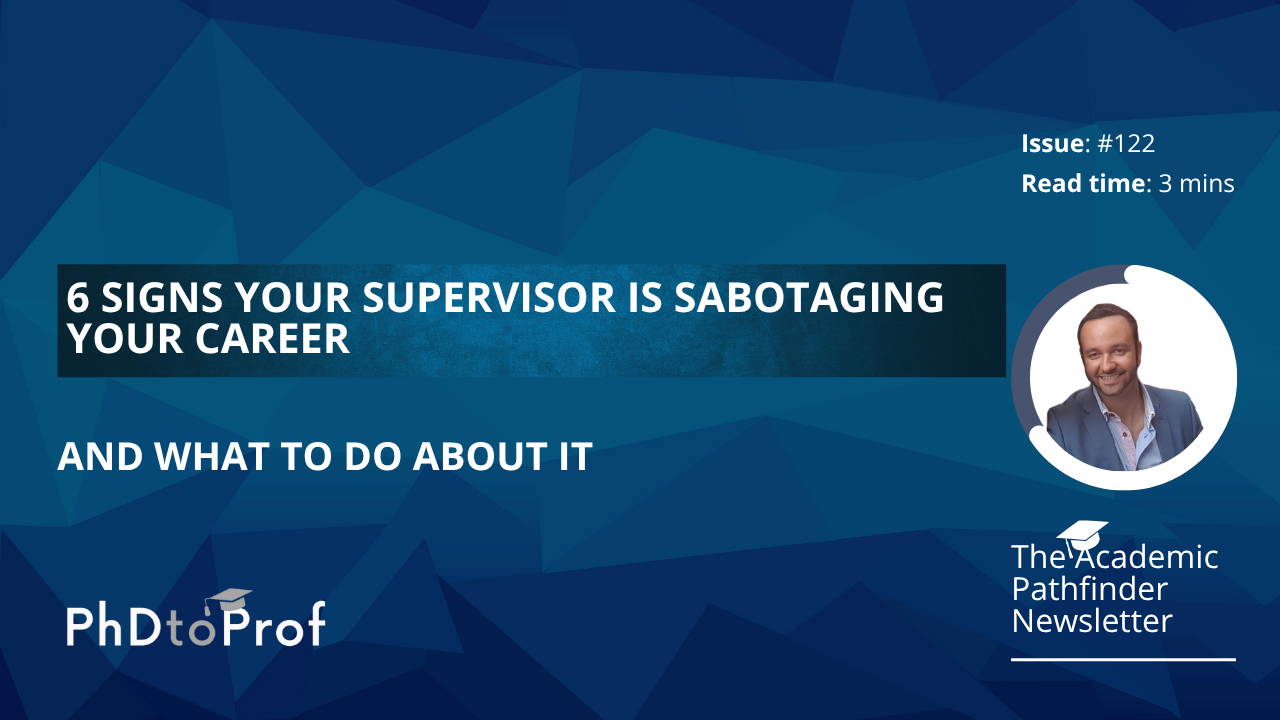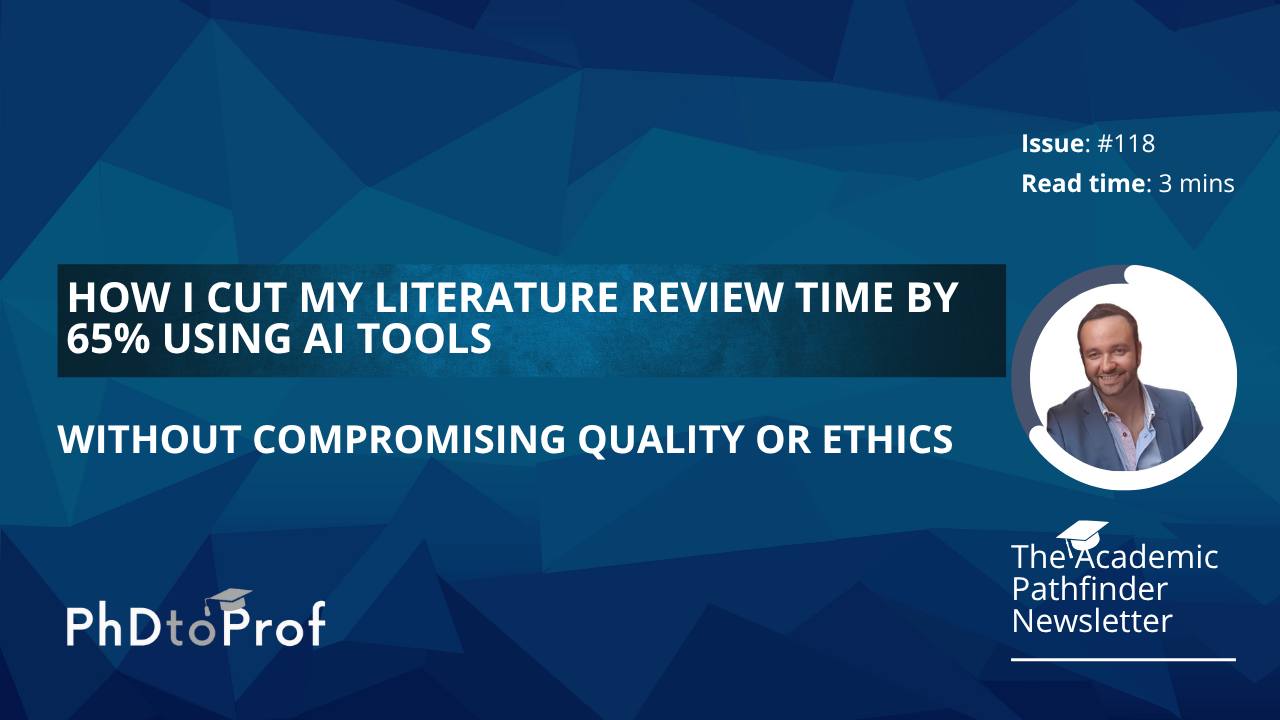#122 - 6 Signs Your Supervisor Is Sabotaging Your Career (And What to Do About It)

Today, I'm sharing six clear indicators that your supervisor is sabotaging your career, plus specific steps to protect yourself and find a path forward.
12 November 2025
Read time: 3 minutes
Supporting our sponsors directly helps me continue delivering valuable content for FREE to you each week. Your clicks make a difference! Thank you. Emmanuel
Protect Your Research From AI Hallucinations
My PhD student discovered 3 fabricated citations in her thesis chapter. Authors that don't exist. Journals never published. Studies that never happened.
ChatGPT hallucinated them. She trusted the AI. She didn't verify. This is happening to researchers everywhere
Paperpal helps you use AI safely in your academic writing.
Whether you're writing your thesis, preparing manuscripts for submission, conducting literature reviews, or drafting grant proposals, Paperpal ensures your AI-assisted work meets journal standards.
👉 Try for free: https://paperpal.com/?linkId=lp_726731&sourceId=phd-to-prof&tenantId=paperpal
Most PhD students and postdocs blame themselves when their supervisor relationship isn't working, spending years thinking they're not good enough when the real problem is a toxic mentor.
While occasional disagreements are normal, some supervisors actively undermine their students' careers through controlling behavior, unfair practices, or neglect.
The difference between struggling under poor mentorship and escaping to success is recognizing the warning signs early and taking strategic action.
Today, I'm sharing six clear indicators that your supervisor is sabotaging your career, plus specific steps to protect yourself and find a path forward.

During my third year of PhD study, I spent months thinking I was failing as a researcher.
My advisor was constantly critical, blocked my attempts to collaborate with others, and withheld co-authorship on work I'd led.
I blamed myself until a trusted professor pointed out that my advisor's behavior was the problem, not my abilities.
Recognizing this pattern gave me the clarity to take action.
I strategically built relationships with other faculty, documented everything, and eventually switched advisors.
That difficult transition saved my academic career.
Since then, I've helped dozens of students identify and escape similar situations before they lost years to toxic mentorship.
Warning Sign #1: They Block Your Professional Development Opportunities
Healthy advisors encourage growth.
Toxic advisors prevent you from building skills, networks, and independence.
What this looks like:
- Your advisor refuses to let you attend conferences, collaborate with other researchers, take relevant courses, or apply for fellowships.
- They say you're "not ready yet" or that it would distract from your dissertation, but these restrictions continue year after year.
What to do:
- Document each request and denial in writing.
- Seek professional development opportunities through other faculty or departments when possible.
If the pattern persists, raise concerns with your graduate program director.
Warning Sign #2: They Take Credit for Your Work Unfairly
Collaboration involves shared credit, but some advisors systematically steal their students' contributions.
What this looks like: Your advisor insists on first authorship for papers where you did the majority of work.
They present your ideas as their own at conferences without proper attribution.
They minimize your contributions when discussing your work with others.
What to do:
- Keep detailed records of your contributions to every project including dates and specific tasks.
- Request written agreements about authorship before starting new projects.
- Consult your institution's authorship guidelines and raise concerns with appropriate authorities if needed.
Warning Sign #3: They Prevent You From Finishing or Create Impossible Standards
Some advisors keep students indefinitely by constantly moving goalposts or adding requirements.
What this looks like: You complete everything required for graduation but your advisor demands additional experiments, papers, or analyses not specified in your original plan.
They give vague feedback that prevents you from making progress.
Other students in your lab take 7+ years to graduate.
What to do:
- Request written graduation requirements and timelines.
- Document all completed work and advisor feedback.
- Involve your thesis committee or program director to establish clear, achievable graduation criteria with specific deadlines.
Warning Sign #4: They Isolate You From Support Systems
Toxic advisors often prevent students from seeking help or building relationships with others who might expose problematic behaviour.
What this looks like: Your advisor discourages you from talking to other faculty, attending department events, or participating in student groups.
They badmouth other professors or make you feel disloyal for seeking advice elsewhere.
They create an "us versus them" mentality.
What to do:
- Maintain relationships with other faculty, students, and staff regardless of your advisor's preferences.
- Join peer support groups and attend department functions.
- Build your own network of mentors who can provide perspective and support.
Warning Sign #5: They Provide No Meaningful Feedback or Mentoring
Some advisors are so neglectful that students can't make progress or learn necessary skills.
What this looks like: Your advisor cancels meetings repeatedly or is chronically unavailable.
They provide no feedback on your writing or research for months at a time.
They seem unaware of your current projects or progress. You're essentially working alone without guidance.
What to do:
- Document meeting cancellations and lack of feedback in writing.
- Request regular scheduled meetings through email to create a paper trail.
- Seek additional mentoring from thesis committee members or other faculty to supplement missing guidance.
Warning Sign #6: They Create a Hostile or Abusive Environment
The most serious problems involve advisors who use intimidation, humiliation, or harassment.
What this looks like: Your advisor yells at you, makes personal attacks, or humiliates you in front of others.
They make inappropriate comments about your appearance, personal life, or abilities.
You feel anxious or physically ill before meetings with them.
What to do:
- Document specific incidents with dates, times, locations, and witnesses.
- Report the behavior to your department chair, dean of students, or Title IX office immediately.
- Seek support from campus counseling services and consider formal complaints through established channels.

Key Takeaways:
- Trust your instincts when something feels wrong rather than assuming all problems are your fault
- Document everything in writing to create a record if you need to escalate concerns or switch advisors
- Build relationships with other mentors who can provide support, perspective, and alternative guidance
→ Your Action Plan for This Week
- Honestly assess your supervisor relationship using these six warning signs
- Start documenting your work contributions, meeting attendance, and any concerning incidents
- Identify at least two other faculty members who could provide mentoring or support
Have you experienced problematic advisor relationships? Reply and share your story (anonymously if you prefer).
Well, that’s it for today.
See you next week.
Whenever you're ready, there are 3 ways I can help you:
1. Get free actionable tips on how to complet your PhD and secure a tenure-track job in academia by following me on X, LinkedIn me Instagram and BlueSky
2. Join my Premium 1:1 PhD Mentorship Program. I provide exclusive, results-driven support for professionals who need fast-track guidance on proposals and thesis completion. DM or email me to learn more about this premium consultancy for serious professionals ready to succeed quickly.
3. Take my proven Academic Job Accelerator Program that has helped hundreds of researchers secure academic positions, and start with my free training videos to learn the exact strategies hiring committees respond to.





Responses